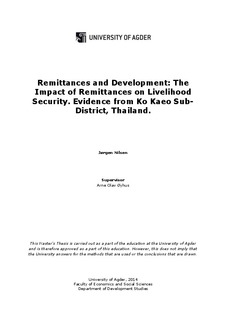Remittances and development : the impact of remittances on livelihood security. Evidence from Ko Kaeo sub-district, Thailand
Master thesis
Permanent lenke
http://hdl.handle.net/11250/222398Utgivelsesdato
2014Metadata
Vis full innførselSamlinger
Sammendrag
In an increasingly globalized world, migrating and sending remittances has become so prevalent that the amount of remittances has since long dwarfed that of official development assistance. Previous research points to remittances as having several positive development effects such as improving education and health for households that receive remittances. Using a mixed methods approach founded on qualitative interviews and questionnaires, this study intends to find out to what degree remittances contribute to livelihood security for rural households in Ko Kaeo sub-district in Thailand. The results show that many young adults aged 20-39 years from Ko Kaeo migrate to other provinces - mostly the central provinces - to work and study. As a consequence, remittances are very common and roughly two thirds of the households in Ko Kaeo receive remittances. Moreover, remittances constitute on average the largest source of non-agricultural income for households that receive remittances. Households in Ko Kaeo receive remittances because of poverty, old age, and because they rear children of migrants who stay behind in the villages. Results from the study also indicate that remittances reduce household inequality and improve food security in Ko Kaeo. No statistical relationship could however be found between remittances received regularly and investments in housing, or rubber or sugar plantations. Likewise, vehicle ownership did not improve as a result of regular remittances. The qualitative data suggest that when households want to make larger investments like those aforementioned, migrants send ad hoc remittances particularly intended for those purposes. The study therefore concludes that remittances contribute to livelihood security by functioning similarly to how a social welfare system functions in other settings by providing poorer households with an extra income. In return they often take care of children of migrants in a kind of contractual arrangement. The study also raises some concerns over the large brain drain and manpower drain from Ko Kaeo to other provinces. In addition, enrolling children in inferior rural schools as opposed to having them live with their parents being enrolled in urban schools is also a point of concern.
Beskrivelse
Master thesis in development management - University of Agder 2014
